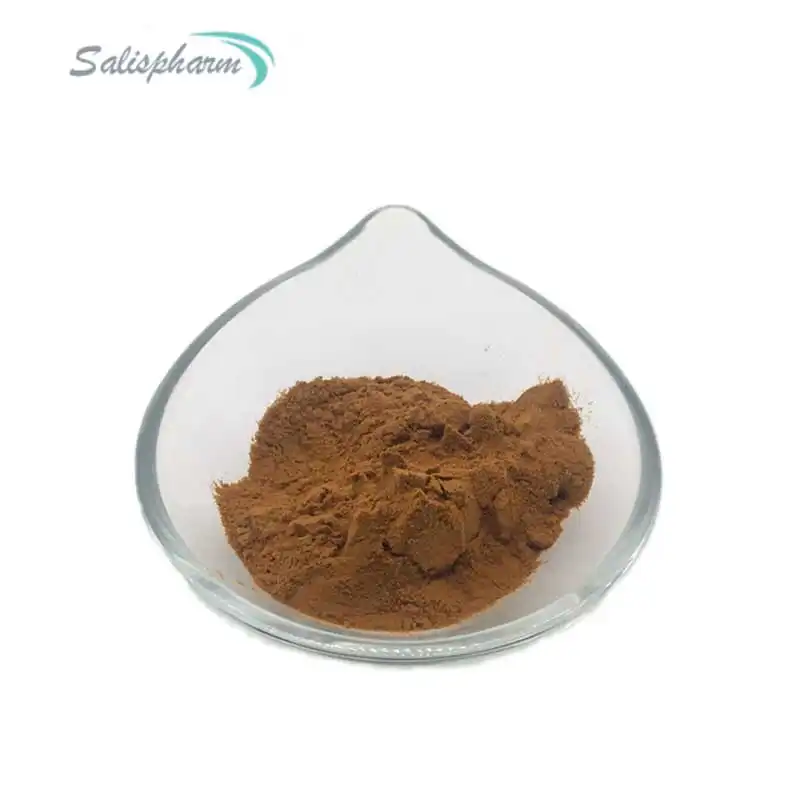Dicyclomine, also known by its brand name Bentyl, is a medication that often raises questions about its primary function and uses. While it's commonly prescribed for certain gastrointestinal issues, there's often confusion about whether it can be classified as a painkiller. This blog post aims to clarify the role of Dicyclomine Powder in medical treatment and address some common questions surrounding its use.
What is dicyclomine used to treat?
Dicyclomine is primarily prescribed to treat a condition called irritable bowel syndrome (IBS), particularly the form that is characterized by abdominal pain and diarrhea. It belongs to a class of drugs known as anticholinergics or antispasmodics. The main action of dicyclomine is to reduce the spasms of the smooth muscles in the gastrointestinal tract. By doing so, it helps alleviate the cramping and pain associated with IBS.
While dicyclomine does have pain-relieving effects, it's important to understand that it's not classified as a traditional painkiller like acetaminophen or ibuprofen. Instead, it works by addressing the underlying cause of the pain in IBS – the muscle spasms in the intestines. This mechanism of action makes it effective for a specific type of pain related to gastrointestinal issues.
Dicyclomine is typically prescribed when other treatments for IBS have not been effective. It's often used in conjunction with dietary changes and stress management techniques to provide comprehensive relief from IBS symptoms. The dosage can vary depending on the severity of symptoms and the individual patient's response to the medication.
It's worth noting that dicyclomine is not recommended for use in children under 6 months old due to potential risks. For older children and adults, the medication should be used under the guidance of a healthcare professional, as they can best determine if it's an appropriate treatment option based on the individual's medical history and current symptoms.
While dicyclomine can be highly effective for managing IBS symptoms, including pain, it's not typically used for other types of pain. For example, it wouldn't be prescribed for headaches, arthritis pain, or general muscle aches. Its specificity to gastrointestinal issues is what sets it apart from more general pain medications.
How long does it take for dicyclomine to start working?
When patients are prescribed Dicyclomine Powder, one of the most common questions they have is about the onset of action – how long it will take before they start experiencing relief from their symptoms. Understanding the timeline for dicyclomine's effects can help patients manage their expectations and adhere to their treatment plan more effectively.
Dicyclomine typically begins to take effect relatively quickly, but the full benefits may not be immediately apparent. Many patients report feeling some relief from their symptoms within 30 to 60 minutes after taking the medication. This initial effect is due to the drug's ability to relax the smooth muscles in the gastrointestinal tract, which can provide rapid relief from cramping and spasms.
However, it's important to note that the full therapeutic effects of dicyclomine may take longer to manifest. For some patients, it can take several days to a week of consistent use before they experience significant improvement in their overall IBS symptoms. This gradual improvement is because dicyclomine works to regulate the functioning of the digestive system over time, not just provide immediate symptom relief.
The variability in response time can be attributed to several factors:
1. Individual physiology: Each person's body may react differently to the medication, affecting how quickly they experience relief.
2. Severity of symptoms: Patients with more severe IBS symptoms may take longer to notice significant improvements.
3. Dosage: The prescribed dosage can impact how quickly the medication takes effect. Healthcare providers may adjust the dosage based on the patient's response.
4. Consistency of use: Regular, consistent use of dicyclomine as prescribed is crucial for achieving optimal results.
5. Other treatments: Dicyclomine is often most effective when used in conjunction with other IBS management strategies, such as dietary changes and stress reduction techniques.
It's crucial for patients to follow their healthcare provider's instructions regarding the dosage and timing of dicyclomine. The medication is typically taken multiple times a day, often before meals, to maximize its effectiveness in preventing gastrointestinal spasms associated with eating.
Patients should be encouraged to keep a symptom diary during the first few weeks of treatment. This can help them track their progress and provide valuable information to their healthcare provider about the medication's effectiveness. If patients don't experience any improvement in their symptoms after several weeks of consistent use, they should consult their healthcare provider. The dosage may need to be adjusted, or an alternative treatment approach may be considered.
While waiting for Dicyclomine Powder to take full effect, patients can employ other strategies to manage their IBS symptoms. These may include:
1. Following a low-FODMAP diet, which eliminates certain types of carbohydrates that can trigger IBS symptoms.
2. Practicing stress-reduction techniques such as meditation, deep breathing exercises, or yoga.
3. Staying hydrated and maintaining a regular exercise routine, which can help regulate bowel function.
4. Avoiding known trigger foods and maintaining a food diary to identify potential dietary triggers.
5. Using heat therapy, such as a heating pad, to alleviate abdominal discomfort.
It's important to note that while dicyclomine can be highly effective for many patients with IBS, it may not work for everyone. Some patients may find that other antispasmodics or treatment approaches are more effective for their particular symptoms. This underscores the importance of ongoing communication with healthcare providers to find the most effective treatment plan.
Can dicyclomine be used for menstrual cramps?
The question of whether dicyclomine can be used for menstrual cramps is a common one, especially given its effectiveness in treating abdominal pain associated with irritable bowel syndrome (IBS). To understand whether dicyclomine is a suitable option for menstrual cramps, it's important to consider the mechanism of action of the drug and the nature of menstrual pain.
Dicyclomine primarily works as an antispasmodic medication, meaning it helps to relax smooth muscles in the body, particularly those in the gastrointestinal tract. Its main use is in treating the symptoms of IBS, including abdominal pain and cramping. Given that menstrual cramps also involve muscle contractions, specifically in the uterus, it's natural to wonder if dicyclomine could be beneficial for this type of pain as well.
While dicyclomine is not officially approved by regulatory agencies like the FDA for the treatment of menstrual cramps, some healthcare providers may consider prescribing it off-label for this purpose in certain cases. The rationale behind this is that the antispasmodic properties of Dicyclomine Powder could potentially help relax the uterine muscles, thereby reducing the intensity of menstrual cramps.
However, it's crucial to understand that the use of dicyclomine for menstrual cramps is not a first-line treatment and should only be considered under the guidance of a healthcare professional. There are several reasons for this:
1. Specific menstrual pain medications: There are other medications specifically designed and approved for menstrual pain relief, such as nonsteroidal anti-inflammatory drugs (NSAIDs) like ibuprofen or naproxen. These are typically the first choice for managing menstrual cramps due to their proven efficacy and safety profile for this specific use.
2. Different mechanism of pain: While both IBS and menstrual cramps involve muscle contractions, the underlying mechanisms and hormonal influences are different. Menstrual cramps are primarily caused by the release of prostaglandins, which cause the uterus to contract. NSAIDs work by reducing prostaglandin production, directly addressing the cause of menstrual pain.
3. Potential side effects: Dicyclomine, like all medications, can have side effects. Common side effects include dry mouth, blurred vision, and constipation. These side effects may be more tolerable when treating a chronic condition like IBS but might be less acceptable for short-term use in managing menstrual cramps.
4. Limited research: There is limited scientific research specifically examining the effectiveness of dicyclomine for menstrual cramps. Most of the evidence for its use in this context is anecdotal or based on its known mechanism of action.
5. Hormonal considerations: Menstrual cramps are closely tied to the hormonal cycle. Other treatments, such as hormonal birth control, may be more appropriate for long-term management of severe menstrual pain.
That being said, for some individuals who experience both IBS and severe menstrual cramps, dicyclomine might offer a dual benefit. If a person is already taking dicyclomine for IBS and notices an improvement in their menstrual cramps, this could be discussed with their healthcare provider as part of their overall treatment plan.
For those considering dicyclomine for menstrual cramps, it's essential to consult with a healthcare provider. They can evaluate the individual's specific situation, medical history, and the severity of menstrual pain to determine if dicyclomine could be an appropriate option. The healthcare provider may also consider other factors, such as:
1. The effectiveness of other pain relief methods
2. The regularity and severity of menstrual cramps
3. Any contraindications or potential drug interactions
4. The overall health and medical history of the patient
It's also worth noting that there are many non-pharmacological approaches to managing menstrual cramps that can be effective and may be tried before or in conjunction with medication. These include:
1. Heat therapy: Using a heating pad or hot water bottle on the lower abdomen
2. Exercise: Regular physical activity, especially in the days leading up to menstruation
3. Dietary changes: Reducing intake of caffeine, alcohol, and salty foods
4. Relaxation techniques: Practicing yoga, meditation, or deep breathing exercises
5. Supplements: Some people find relief with supplements like omega-3 fatty acids or magnesium, although scientific evidence for their efficacy varies
In conclusion, while Dicyclomine Powder is not typically used as a first-line treatment for menstrual cramps, it may be considered in certain cases under medical supervision. The decision to use dicyclomine for this purpose should be made in consultation with a healthcare provider, taking into account the individual's overall health, the severity of menstrual pain, and the effectiveness of other treatment options. As with any medical treatment, the potential benefits must be weighed against the possible risks and side effects.
If you are also interested in this product and want to know more product details, or want to know about other related products, please feel free to contact iceyqiang@aliyun.com.
References
1. Trinkley, K. E., & Nahata, M. C. (2011). Treatment of irritable bowel syndrome. Journal of Clinical Pharmacy and Therapeutics, 36(3), 275-282.
2. Ford, A. C., Moayyedi, P., Lacy, B. E., Lembo, A. J., Saito, Y. A., Schiller, L. R., ... & Quigley, E. M. (2014). American College of Gastroenterology monograph on the management of irritable bowel syndrome and chronic idiopathic constipation. The American Journal of Gastroenterology, 109(S1), S2-S26.
3. Ruepert, L., Quartero, A. O., de Wit, N. J., van der Heijden, G. J., Rubin, G., & Muris, J. W. (2011). Bulking agents, antispasmodics and antidepressants for the treatment of irritable bowel syndrome. Cochrane Database of Systematic Reviews, (8).
4. Khanna, R., MacDonald, J. K., & Levesque, B. G. (2014). Peppermint oil for the treatment of irritable bowel syndrome: a systematic review and meta-analysis. Journal of Clinical Gastroenterology, 48(6), 505-512.
5. Camilleri, M. (2018). Pharmacology of the new treatments for lower gastrointestinal motility disorders and irritable bowel syndrome. Clinical Pharmacology & Therapeutics, 104(4), 645-658.
6. Rees, M. C. P., Turnbull, A. C., & Bourne, G. L. (1985). Effect of dicyclomine on uterine motility and menstrual pain. British Journal of Obstetrics and Gynaecology, 92(6), 610-613.
7. Proctor, M., & Farquhar, C. (2006). Diagnosis and management of dysmenorrhoea. BMJ, 332(7550), 1134-1138.
8. Dawood, M. Y. (2006). Primary dysmenorrhea: advances in pathogenesis and management. Obstetrics & Gynecology, 108(2), 428-441.
9. Marjoribanks, J., Ayeleke, R. O., Farquhar, C., & Proctor, M. (2015). Nonsteroidal anti-inflammatory drugs for dysmenorrhoea. Cochrane Database of Systematic Reviews, (7).










